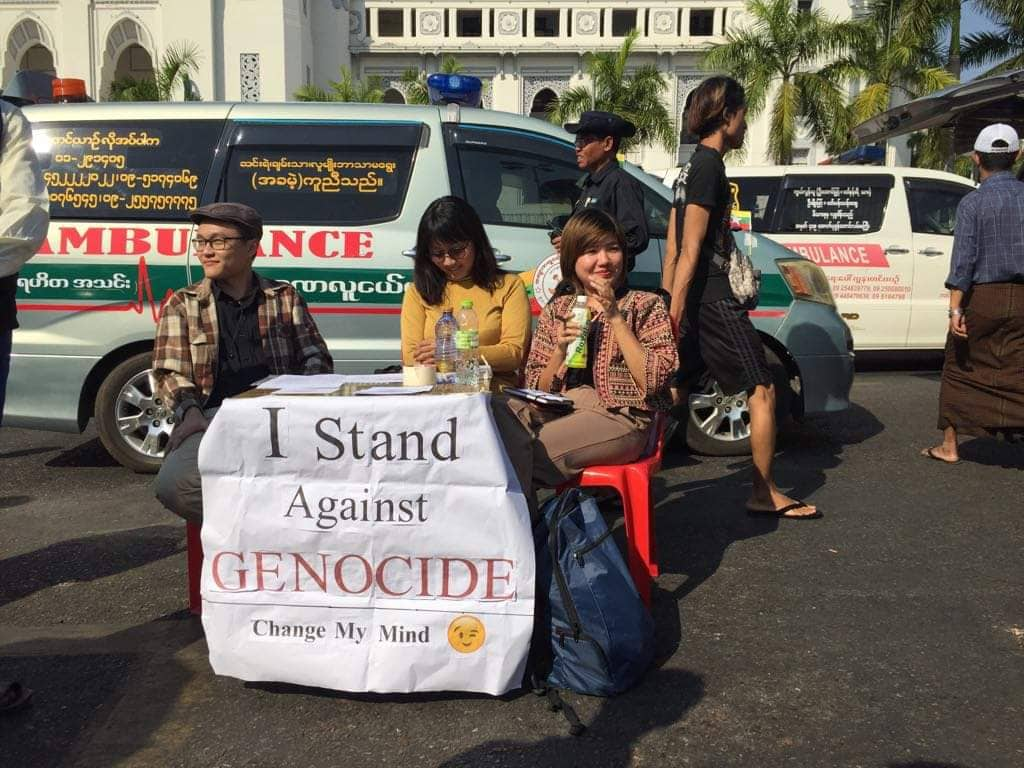
As lawyers for Gambia yesterday implored the United Nations’ top court to provide protection for the Rohingya Muslims still in Rakhine state, Aung San Suu Kyi sat opposite the judges; perhaps comforted that away from the accounts of rape and murder were thousands of compatriots cheering her name.
Some supporters even travelled from Myanmar and other nations to The Hague for the three-day hearing. Meanwhile, rallies across the country celebrated her decision to defend allegations of genocide against the Rohingya.
The International Court of Justice (ICJ) case is directed at the Myanmar people, claims state media, and is an affront to the nation’s dignity. But three young activists amid a thundering of pro-Suu Kyi chants in downtown Yangon manned a table displaying in English: “I stand against genocide, change my mind.”
They distributed Burmese-language leaflets on the definition of genocide as well as the Myanmar 2008 Constitution definition of state and a question asking: “According to the current law of Myanmar, are you the state?”
“The state is defined as the people in the government organisation,” one of the activists, Zin Linn, 23, told Myanmar Mix. “The state is not the people and we wanted to show that.”
“We expected people to be sensitive and aggressive to us, but when we got there, they didn’t understand what genocide is, what the ICJ accusations are, or even what the ICJ is. They just came to support Aung San Suu Kyi.”
After about 20 minutes an organiser of the pro-Suu Kyi rally threatened to sue the activists and called over a police officer, said Zin Linn. By then, their leaflets were dwindling—partly because rally organisers had scooped up so many—so they left.
“[The state] is making the majority of people become criminals and deniers like them, manipulating the people by using the support of Aung San Suu Kyi,” adds Zin Linn.
His small group is among pockets of dissenting voices within Myanmar arguing the National League for Democracy’s (NLD) "affront to dignity" claim muddies the waters. The Myanmar army led the 2017 bloody campaign that drove out around 740,000 Rohingya to Bangladesh and some people are risking relationships with friends and family to call for accountability over the crimes.
“Some supporters of the NLD may get angry because I support the rights of the Rohingya,” says Thu Aung, 28, an atheist from a Buddhist background in Bago region. “They should have human rights and freedom of religion and expression. As humans they’ve a right to have a life in the area where they were born."
The majority of people in Myanmar view the Rohingya as illegal immigrants from Bangladesh, but Thu Aung said the minority should have the same rights as other ethnicities in the country.
With a dominant state media, Myanmar does not have a “clear message of what is happening” in Rakhine state, he said.
But he believes the public will eventually face up to the atrocities in Rakhine state, adding that “we still have a future if we can promote federalism and equal rights.”
Yangon-based Esther, 25, an independent researcher, asked to conceal her ethnicity and religion because she was concerned it would make further targets of her minority group.
Although some of her relatives were initially swayed by the government line—“every national news channel is mentioning this case belongs to every one of us,” she says—their past experience as victims of state-sponsored violence soon made them question it.
“These kinds of cases have been happening for over 60 years,” she says. “Not only in Rakhine state but also in other ethnic areas. This case has only come to the world stage because Bangladesh can be a witness. We have to accept it and face the problem by not covering up the mess.”
For everyone except those who committed the crimes to take responsibility is senseless, she adds, saying that her friends reject the idea of the case damaging the dignity of the Myanmar people because “we only stand with the dignity of the victims. We do not want to stand with the perpetrators.”
Yangon Youth Network president, Zay Linn Mon, 23, argues that Myanmar “can not bring justice for the Rohingya, so other countries around the world have to become involved.”
Zay Linn Mon said his stance on reform issues has already cost him friendships, but that “to improve the image of Myanmar, we must accept what happened in Rakhine state.”
"We hope Aung San Suu Kyi will accept what is happening in Rakhine and work together with the international community,” he says. "That is the only way Myanmar can improve its image again. Denying genocide will not promote its image.”
Aung San Suu Kyi is due to speak at the ICJ today, and is expected to argue that the court has no jurisdiction and that Myanmar was targeting Rohingya militants.
Stay tuned for more coverage.

